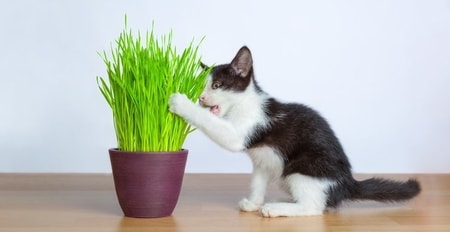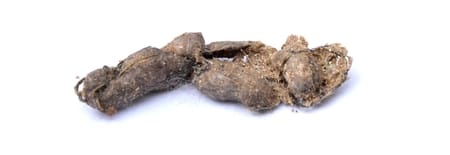
If you are a dedicated cat owner like I am, you will be aware of your cat’s habit of eating grass whenever they wander around the garden.
You will also be aware that this habit of chewing the grass often results in that unpleasant soggy pile of bile and grass vomited onto your nice clean floor! Don’t we all love that nice surprise courtesy of your kitty?
Why does our carnivore cat suddenly start acting like a farmyard cow and start grazing on grass whenever they get the opportunity? A snack here, another munch there … what’s the story?
You may be wondering like I was, does my cat really need to eat grass?
The Answer Is Yes … And Here Are The Reasons Why.
Indoor cats need to eat cat grass because:
- It settles their digestion system by helping them to expel undigested food.
- Intestinal parasites get caught in the grass and expelled in their poop.
- Reduces their anxiety.
- Helps them to not eat plants in your house which can be toxic instead.
- Make sure it doesn’t contain pesticides.
Settling the digestion system

Research confirms that cats may chomp into the grass due to an instinctive reaction to help settle their digestive system.
- Sometimes the need for some fiber as explained by Know Your Cat is overwhelming as a response to help clean out their tummy after eating something they probably shouldn’t have. These findings are in line with many veterinarian points of view, such as on the Hills Pet Vet website information listed in the resources at the end of the article.
- Most vets acknowledge that cats are not equipped with certain enzymes within their stomach to digest grass, but the regurgitation that it induces helps them to expel undigested food from their gut, thus giving them an effective cleanout.
Calming anxiety

Anxiety is another reason for our cats to indulge in a little ‘salad.’ I don’t know about you, but when I am anxious or a little uptight, eating something helps to settle the butterflies in my stomach.
- PetMD when conclude in their article that a cat who is under stress or suffering anxiety may chew on grass to calm their nerves.
- They also suggest it is because of the traces of vitamins A & D and niacin that may help them to chill out
Intestinal Parasites

Other experts (such as Vet Street), suggest that the grass fibers can control the intestinal parasites that all pets can have.
- While internal parasites are not a pleasant topic and analyzing your cat’s poop is something we all would prefer to avoid, veterinarians have often found traces of parasites trapped within the grass fibers expelled by your pet – better out than in is what I say.
Your cat enjoys it!

Your cat seems to enjoy the taste of grass and the texture- they get oral satisfaction from eating fresh grass.
- Why else would they repeatedly eat those greens? While it may seem odd to us, and the regurgitation a tad unsettling, to our cats it is completely normal behavior.
- Just like we like a bit of salad with our steak to help fill us up, have you ever considered that your cat may be the same?
The Negative Sides to Your Cat Eating Grass
With anything positive, there is always a negative – it is the balance of life at work. In this case, the negatives of your cat snacking on grass are very low. Here is what I have found from my extensive research.
Be aware of pesticides in the grass and garden.

- While eating grass is completely natural and healthy for your cat, you must be vigilant to avoid using pesticides or other chemicals on your lawn as they are detrimental to your cat’s health.
- Your cat has a moist nose, which makes any pesticide breathed in stick to the mucous membrane and thereby enter its body.
- Your cat may pick up the chemicals on their paws as they walk across the grass, then when they clean their paws or fur, they swallow the chemicals.
- Signs of toxicity as described by petpoisonhelpline include acting out of character, lack of concentration, fever, vomiting, and seizures. If your cat exhibits these tell-tale symptoms you need to get your cat veterinary treatment immediately.
Compulsive eating of grass can cause intestinal problems
- Excessive grass can cause a blockage within the stomach which can cause distress for your cat.
- Grass can get stuck in the throat or intestinal tract and may need help to be removed.
- Compulsive eating of greens can be a sign that your cat has other health problems that your vet needs to check out.
Toxic Plant Effects
- An indoor cat that has no grass to satisfy their oral pleasure will probably turn to any pot plant or flowers that you have within the house.
- Be aware that many plants and flowers are deadly for cats, especially lilies, daffodils, Chrysanthemum, Peace Lily, Tulips, and so on.
- If your cat suddenly starts drooling, breathing becomes difficult, or they get sudden diarrhea, get it to the nearest vet immediately.
- The toxins in some plants can work fast and can be deadly to your beloved pet. If you can tell which plant your kitten has been eating, take a sample with you to your vet.
Unpleasant ‘gifts’ in your house

- The unpleasantness of the odd hairball or pile of soggy pile of intestinal garbage that has either been vomited out the mouth or passed out the other end in loose stools is a reality we have all had to face as part of being a devoted cat owner
- But the unpleasantness is overcome by the general well-being that your cat gains from eating grass. Therefore I believe it is well worth the occasional cringe at having to clean your cat’s embarrassing slipups.
How to Meet Your Cat’s Need for Grass
An Indoor cat doesn’t have the option to graze on the lawn unless you take them outside on a harness, and then you can’t be sure what pesticides the gardener has used to get the lush lawn that you are so proud of.
I have found that growing shallow trays for indoor use is the best solution.
I usually have two or three trays growing at a time, which allows me to swap the trays around when my cat has chomped the grass down.
This allows recovery time for the used grass tray, rather than starting a new tray from scratch.
Household Grass Trays – A Tasty, Healthy Treat for Your beloved cat.

The inclusion of a tray or two of lush grass set out within the home for the indoor cat is a little additional work, but your cat will appreciate your thoughtfulness!
Having a grass tray will also provide a break when your cat is home alone and are perhaps a bit anxious for your return. There is nothing like a comforting chew to pass the time of day.
Here are some valuable tips for growing the best grass for your cat:
- Misting the grass with water means your cat will get a moist, tasty experience, and chewing the grass will become a favorite pastime.
- Some pet stores supply trays of grass, but it is simple to grow your own, and to be honest, it is a very satisfying occupation. All you need is a tray, some potting mix from your local garden center, and some seeds. When you grow it yourself, you know it is healthy for your cat.
- Wheat or Oat grass is often the best variety, and a neat tray placed in the home for your cat will be a real treat.
- A tray of lush grass is attractive and won’t detract from the aesthetics of your home. It will also save your indoor plants from cat attacks!
If you are unsure about how to grow your own grass for your cat, just ask at your local gardening store, and they will be happy to show you what you need to get going. The staff at the garden centers are there to help, so don’t be shy about asking them.
Conclusion
From all the information I have gathered and the research that was undertaken, I can confirm that eating grass truly benefits your cat. The action assists them to maintain healthy bodily functions.
Not only that, your cat enjoys quietly munching away on the grass even if it may cause them to gag occasionally.
One further benefit that must be stated, is that the action of chewing grass can even help to clean their teeth!
With all the benefits and minimal downside, why not provide your cat with one of the most helpful ‘medications’ that an outdoor cat enjoys … the ability to nibble a grass blade or two when they feel so inclined.
It is a natural behavior for all cats, regardless of whether they enjoy an indoor lifestyle or whether they are free to roam.
Writer: Jean Brewer

Sources
https://thecatsite.com/threads/do-cats-really-need-grass.56163/ A forum
https://www.petmd.com/cat/care/evr_ct_how-to-grow-cat-grass Pet MD
https://www.vetinfo.com/health-benefits-cat-grass.html Vet info site
https://www.hillspet.com/cat-care/behavior-appearance/why-do-cats-eat-grass vet site
http://www.animalplanet.com/pets/why-do-cats-eat-grass/ Animal planet
https://www.purina.com/articles/cat/behavior/why-cats-graze Purina
https://www.rd.com/advice/pets/why-do-cats-eat-grass/ Readers digest
http://www.vetstreet.com/our-pet-experts/why-does-my-cat-eat-grass-or-houseplants Vet street
https://www.youtube.com/watch?v=jcZnpYk0cfI Better homes and gardens
https://www.youtube.com/watch?v=XluezSVLl2M Doctor sherlock
https://www.youtube.com/watch?v=d27cVL3aRTE Ktsune Siberian Forest Cats
https://www.petmd.com/cat/emergency/poisoning-toxicity/e_ct_poisonous_plants
http://npic.orst.edu/factsheets/petspest.html re pesticides and pets
https://www.knowyourcat.info/info/catingrass.htm Know your cat
https://www.aspca.org/pet-care/animal-poison-control/toxic-and-non-toxic-plants Aspca.org
https://www.petpoisonhelpline.com/pet-safety-tips/are-poinsettias-poisonous-to-cats-dogs/ Pet poison helpline